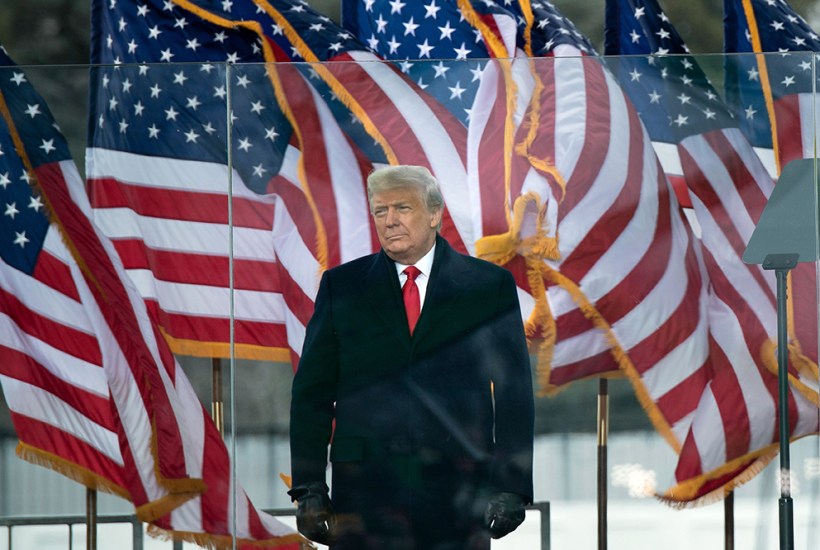The latest charges against Donald Trump will do nothing to deter his many supporters within the Republican party. On the contrary, his indictment by a grand jury set up by special counsel Jack Smith plays into the former president’s narrative of victimhood and makes it even more likely that he will be chosen as a candidate.
And that, curiously, is exactly what many senior Democrats want. To his electoral opponents, Trump seems reliably toxic – millions of Americans will turn out to vote against him.
Even if he is convicted of the latest four charges – which include conspiracy to defraud the US and conspiracy against the rights of citizens – Trump might not be debarred from office. He has already been impeached over his role in the events of 6 January 2021. This latest indictment – on top of several others Trump faces – seems unlikely to do more to stop him. There’s no constitutional rule that stops him campaigning for the White House from prison.
All this leaves many bewildered at the state of US democracy. How can a country of 330 million not find two more appealing candidates for its highest office than Donald Trump and Joe Biden?
That Trump behaved disgracefully after his defeat in the 2020 presidential election, egging on the movement which resulted in the riots at the Capitol, should go without saying. If he has broken any other laws, whether it be covering up his tax records to conceal hush-money payments or illegally hoarding classified documents, he should be brought to account. However, there is truth in his claims that the justice system is being ‘weaponised’ against him.
It is hard to deny that a good part of the clamour to indict Trump is politically motivated rather than simply a desire to see justice done. The latest charges could hardly be better timed to inflict damage on the Republicans. They increase Trump’s chances of winning the nomination but (his opponents think) make him more unpalatable to independent voters outside the party.
If this is the scheme, it is far from a guaranteed success. On current polling, Trump is still neck and neck with Biden, and the latest charges may not get very far in court.
The recent indictment over the run-up to 6 January – that he engaged in a ‘conspiracy’ to defraud the United States, obstruct Congress and deny the constitutional rights of Americans to vote – will be very hard to prove convincingly. A defeated election candidate has to be allowed to challenge the result, to demand that evidence of malpractice be investigated.
The case against Trump rests on him going rather further than that and actively plotting with rioters to spread lies he knew to be false about a ‘stolen election’. Evidence for that is not yet apparent. Trump’s behaviour was reckless but that doesn’t in itself make him a criminal fraudster.
Lamentably, justice and politics are increasingly intertwined in America. ‘Lawfare’ has become an integral part of the US democratic process, with both sides of the political divide involved. Trump has become the first president or former president to face criminal charges since Ulysses S. Grant was arrested for speeding in a horse-drawn carriage. Special prosecutors and grand juries were deployed against Bill Clinton on multiple lines of inquiry.
Trump did not start the business of questioning the validity of election results. It has become almost a formality that the legitimacy of a president be questioned by his opponents. Some never accepted George W. Bush’s victory after the close result in Florida, and it was a month before Al Gore conceded. There were attempts to undermine Barack Obama with false claims that he had not been born in the United States, and of course Trump himself was the subject of wild accusations that his election victory had been brought about by Vladimir Putin – accusations which large parts of the media accepted with very little persuasion.
We in Britain should not feel smug about what is going on in the US. Our democracy has often looked as if it too could go the same way in recent years. In the Commons it is no longer enough to argue against the merits of your opponent’s policies and ideas. Commons committees, which were set up to inform policymaking, have evolved into de facto inquisitions, with MPs determined to haul in their opponents to be drilled in what looks more like a legalistic rather than political fashion.
The former Labour chair Tom Watson made a career out of promoting criminal conspiracy theories about alleged child sex rings involving Tory politicians. These conspiracy theories eventually collapsed after inflicting much damage on those accused.
No one is above the law. But it is a depressing development when legal processes are used as a political tool. In a well-functioning democracy, politicians make the law, lawyers enforce it, and the two are kept well separated. In the US, and to a lesser extent in Britain, the line between the two is becoming dangerously blurred.
Got something to add? Join the discussion and comment below.
Get 10 issues for just $10
Subscribe to The Spectator Australia today for the next 10 magazine issues, plus full online access, for just $10.
You might disagree with half of it, but you’ll enjoy reading all of it. Try your first month for free, then just $2 a week for the remainder of your first year.














Comments
Don't miss out
Join the conversation with other Spectator Australia readers. Subscribe to leave a comment.
SUBSCRIBEAlready a subscriber? Log in